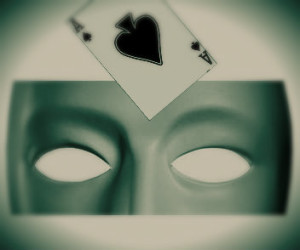We begin the journey the first time we play poker. When we sit down in a casino, online or (more often than not) in a home game. We start as complete beginners, but from there we develop as players, improving our play, discipline and attitude. Hopefully our play will continue to improve and we will eventually become winning players and then move on to beat bigger and bigger games.
Of course, it doesn’t quite work like that most of the time. Not every player is destined to become a feared high limit player. Not every player is destined to become a winning player at all. In fact the majority won’t, they will be losing players indefinitely or until they eventually give up playing. Nothing is destined in poker. You will improve as a player as long as you put in the work and have the ability to grasp the concepts involved. Simply playing poker for a long time does not make you a good player. Likewise, being a relative beginner does not necessarily make you a bad player.
As our game improves, so will our results. But how much our game improves depends more upon our attitude than anything else. In order to improve as players, we often have to make radical changes in the way we approach the game rather than in our specific betting decisions. Hence our progression can more accurately be seen as a series of stages, which we must traverse in order to improve. In this article we will be looking at the journey in detail and identifying these stages. We will look at why players get stuck at particular stages and how they can get moving again. Hopefully you can identify your own progress on the journey and gain insight into how you can ascend to the next level.
Stage 1 – Green Newbie
Everybody starts the journey from square one. That first game where you have no idea about correct poker strategy or any strategy at all for that matter. Because you haven’t yet begun to peel back the layers of poker strategy, it looks like a very simple game. You receive two cards, you get five community cards and you see who has the best hand. In fact, if you are struggling with anything, it is probably the rules or remembering what hands beat what.
The obvious problem at this stage is that you haven’t even identified the skill element in poker, let alone taken steps to master it. You treat poker like roulette, just a way of wagering money with luck determining the outcome. To progress to the next stage, you must learn that your betting decisions make a difference. It is not simply a matter of calling to the end and see if you have won, it is maximising your winnings and minimising your losses. You need to develop at least a rough idea of what hands are good and what hands are bad on various streets ad in various circumstances.
Some players instinctively grasp this aspect of the game and move to Stage 2 very quickly indeed. Players that don’t are usually those that approached the game as gamblers rather than gamers. They fail to grasp even the basic concepts of the game, because they fail to acknowledge they are doing anything other than gambling. I doubt anybody reading this article is stuck at this level, because those that are would certainly not think to look on the internet for poker advice.
Stage 2 – Overconfident Amateur
Once you master the rules of the game, you will start to notice various patterns with the way the game plays out. AA wins a lot more often than J7o. If you flop a set you will usually win. Some starting hands don’t seem to make winning hands very often at all. Combine these observations with what you pick up from other players and maybe the odd poker article and you will develop some rudimentary strategy. You are now at Stage 2.
At Stage 2, you start to make plays designed to maximise your winnings and minimise your loses. If you are confident you hold the best hand, you will bet or raise. If your hand is a complete lost cause you will fold. If you are unsure you will check or call down. You will probably still be very loose/passive, doing way too much checking and calling rather than betting and folding, but at least you are seeing the value of winning bigger pots with your monsters and losing less when you are weak. You are starting to think strategically.
Unfortunately, once you peel back this first level of strategy, it is easy to overestimate your ability. You are still a losing player, but you can’t understand why. It seems you get very unlucky, being outdrawn all the time. You do not realise that you are still a poor player and are losing because you are being outplayed. To progress to stage 3, you need to realise that poker is actually a complex game that is difficult to master. You need to first accept that you have a lot to learn and then take steps to learn it.
Many players never progress from Stage 2. Some simply don’t realise they are playing poorly, stuck in a never-ending cycle of winning occasionally, losing often and blaming bad luck. Some reach a level of acceptance, realising that they don’t have the aptitude, patience or discipline to beat the game. These ‘casual players’ may continue to play if they enjoy the game and are happy to pay for this entertainment. Some people play for years or even decades without ever moving beyond this stage.
Stage 3 – Determined Student
To reach Stage 3, you need to accept the uncomfortable truth that you are losing money because you suck! You need to realise that poker strategy is complex and difficult to master and you must become a student of the game. You need to read books, forums and articles in order to build a solid foundation for your poker game. You then need to put this knowledge into practice when you sit down at the tables, gaining experience in different situations. You then need to go back to the books, recycle and repeat.
It may take a long time before everything finally ‘clicks’ and you become a winning player. Or, if you are especially talented it might happen very quickly. In order to progress to Stage 4, you will need a solid grounding in many poker concepts. You need to understand pot odds, implied odds, value betting, bluffing and how to get away from hands that will lose you money, especially pre-flop. You may also learn more advanced plays such as pot equity, isolating plays and metagame plays. At some point, your game will have developed to a point where you are a winning player.
However, despite your hard work, it is possible to get stuck at Stage 3. A willingness to learn on its own will not guarantee your long-term success at poker. There are a number of personality traits that can hold you back, despite your best efforts. Alternatively you might have the ability to be successful but just approach the learning process in the wrong way. One common pitfall is to study a lot, but stubbornly hold onto some of your old habits, despite what you are told. Another is to learn a lot, but lack the confidence to put some of the more counter-intuitive plays into practice.
Stage 4 – Complacent Journeyman
It is an exciting time for a poker player when they first start to consistently win money, no matter what the limit. Making money from a hobby is a very satisfying thing indeed. Unfortunately, once the cash starts flowing in, a lot of the enthusiasm for learning found in Stage 3 starts to wane. It is easy to see things in black and white, to think that you have crossed the boundary from a bad player to a good player, not realising that ‘good player’ is a completely relative term and all you have really done is become just good enough to win money.
If you could continue the student mentality of Stage 3, you could skip Stage 4 completely and move on to Stage 5. But most players get bogged down at Stage 4, at least for a while. You bask in your achievements and stop trying to improve your game. You develop an unfortunate arrogance towards poker, feeling that you have somehow mastered it. You might get mad when you take a bad beat, suffer a bad session or have to endure a prolonged downswing, because they seem to be affronts to your talent. Once you have proven to yourself that you can win at poker, any events that stick a spanner in your schemes to ‘get rich’ are more difficult to deal with.
To move on to Stage 5, you need to come back down to earth and rediscover the cycle of analysis and improvement that made you a winning player in the first place. You must realise that becoming a winning player is not the end of the journey, but somewhere near the beginning. You must not be content with scraping a few dollars winning at the lower limits, but instead have the drive to want to beat the highest limits possible for as much money as possible. You need to see how much you have to learn rather than how much you have already learned.
Lots of players don’t manage to do this. They never regain the enthusiasm to improve and instead maintain an equilibrium of being a complacent journeyman. They are convinced they are a great player and don’t understand how their results don’t always reflect this. They may lie to others and even to themselves about how much money they make. Over time they may even regress back to being a losing or break-even player. Like Stage 2, Stage 4 is a graveyard of undiscovered potential.
Stage 5 – Enlightened Artisan
This represents the final stage of your poker development. It doesn’t represent the point where your game is as good as it can be, quite the opposite in fact. It represents the point where you realise that your game is never as good as it can be. The point where you decide that you want to keep on improving, striving to identify areas to work on and then acting on them. The point where you dedicate yourself to a continual cycle of analysis and improvement.
It is only at Stage 5 where you will fully realise your potential as a poker player. Obviously you can only go as far as your natural talent and capacity to learn will take you, but for most people that is a lot further than they think. The upper echelons of the poker world are mostly filled not by professors, mathematicians and advanced game theorists (although these groups are represented of course), but by players who worked hard to be the best they could be, who never satiated their thirst for knowledge, who always wanted to take the next step.
For these kinds of players, the sky’s the limit.
Ian Taylor, AKA “Piemaster is the Co-Author of the highly regarded Poker Psychology Book “The Poker Mindset”.
Submit your review | |




